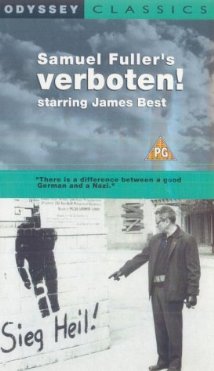
VERBOTEN!
US, 1959, 93 minutes, Black and white.
James Best, Susan Cummings, Tom Pittman, Harold Daye.
Directed by Samuel Fuller.
Samuel Fuller made a number of very strong, often small-budget films in many genrres from the 1950s to the 1980s. Early he made such dramas as Pickup on South Street, later making westerns with Barbara Stanwyck. But he had a strong interest in war films and this one is one of his strongest.
It is set at the end of World War II, the American troops advancing into German towns, the final stances, the arrival of the Allies, the setting up of administration for the Germans, especially in food and countering the black market. The film also shows the subversive group, the Werewolves, established by Himmler with the Hitler Youth to fight back should Germany lose the war.
James Best portrays the American soldier who is wounded, is sheltered by a German woman, Helga, played by Susan Cummings, and stays after the war to help with the American administration, marrying Helga. Tom Pittman portrays Bruno, head of the werewolf is, working under cover with the Americans but leading a band of fanatics, repeating the words of Hitler, merciless. He turns David against Helga. (Unfortunately, Tom Pittman was killed in a car accident at the age of 26 soon after the release of this film.)
Helga takes her brother, part of the Werewolves, to the Nuremberg trials where he sees footage of the concentration camps and other horrors of the war, something he did not know, which leads him to tell David about Bruno and there is a final climax between Franz, Helga’s brother, and Bruno in a blazing train carriage.
One of Samuel Fuller’s most ambitious and finest war films is his story of a sergeant in World War I and in World War II in Belgium, The Big Red One.
1. The title and its use throughout the film?
2. World War II, a view from the late 1950s?
3. The work of Samuel Fuller, strong and tough, his war stories over the decades? An American perspective? With a feel for Europe?
4. The black-and-white photography, the atmosphere of the war years, action in the war? The incorporation of newsreel footage? Hitler, action? The
Nuremberg trials? The musical score?
5. The war episode, the town, the American attack, the camaraderie, the snipers, the advance into the town, deaths, the empty streets? David and his taking refuge with Helga and Franz? The reactions? David and his being wounded? His suspicion of the two as Nazis? All Germans as Nazis? Their helping him, hiding him? The SS officer and his advances on Helga? David remaining hidden, found by the Allies? The effect of the experience?
6. David, the shelter, the wound, attracted to Helga, the bond, her explaining that all Germans were not Nazis? Issues of hunger, David and his love for Helga, the marriage? His accumulated points to go back to America but not going?
7. Out of the military, but getting a job, with the American forces, the administration of the town? His role in decision-making, the food, the black market?
8. The rebel group of Werewolves? Instituted by Himmler, advocacy in the Hitler Youth? Now young men after the war, the gathering, the train, Franz and his joining? Bruno, his leadership, philosophy, Hitler’s words, tough and merciless? Fanaticism and violence?
9. The protest in the street, the Germans wanting food, the young Werewolf man and his continuous harangue, David and his response, anger, the brawl? His being let go from his job? But his wanting to stay in Germany?
10. The protests, the words voiced by the protester, the Germans, hungry, memories of World War I and its aftermath?
11. Bruno, his leadership, his job with the Americans, his cover? Friendship with David, his insinuations about Helga, the reason for her marrying David, quoting her as saying that he was a ticket for food? The effect on David, going home, confronting Helga, the pregnancy, her reply, his disgust ?
12. Bruno and the meetings, his sitting on observing, his speeches, the protester, drawing the circle on him and asking for him to be stabbed? His ruthlessness?
13. The Nuremberg trials, Helga taking Franz, his sitting in, the graphic film of suffering, concentration camps, hunger? Franz watching, saying he didn’t know, comparing Hitler’s words to those repeated by Bruno?? The incorporated footage of the war criminals and the trials? The long initial speech of the prosecutor?
14. France, giving information about Bruno?
15. David Helga, love and the reconciliation?
16. France, getting the list, Bruno attacking him, Franz setting fire to the carriage? The flames, David rescuing Franz? Their future?
17. The impact of the film for the 1950s? Later?